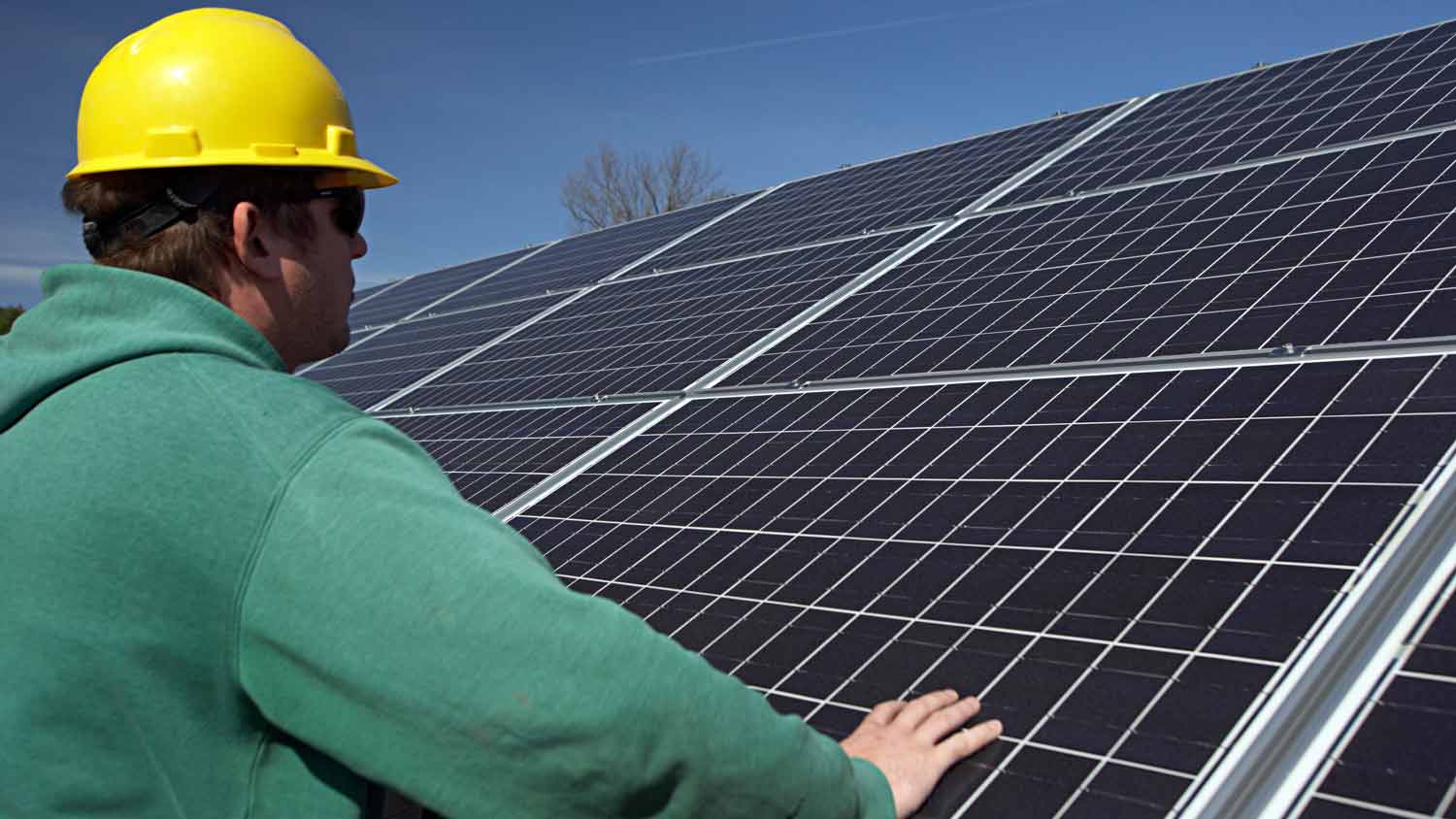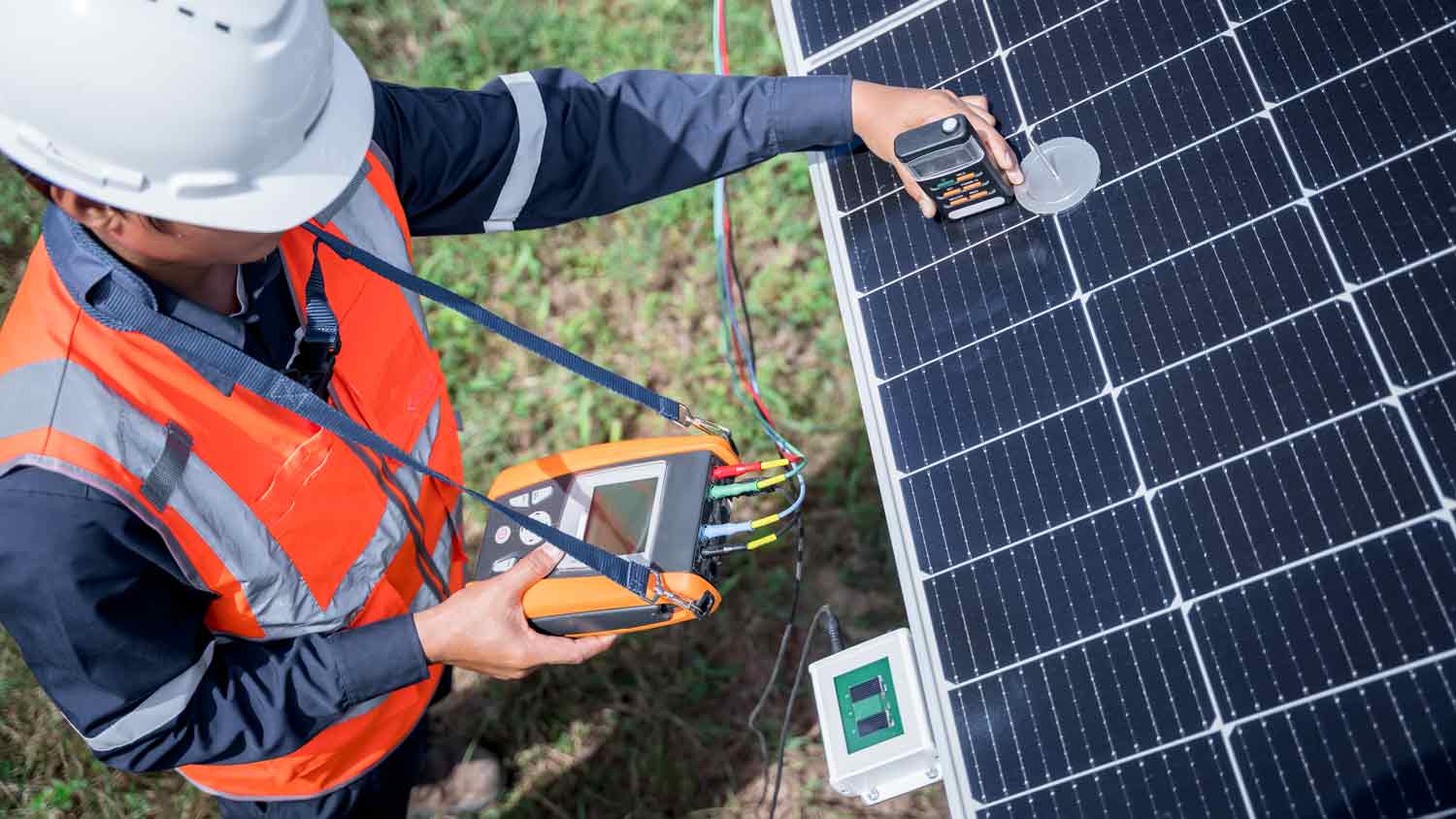
Discover the average solar panel installation cost, key price factors, and expert tips to help you budget for your solar project.
The average cost to remove solar panels is $1,200, with most homeowners paying between $1,000 to $3,500, depending on system size, labor, and complexity.


Solar panel removal is the process of safely disconnecting and detaching solar panels from your roof or property.
The main cost factors include the total number of panels, labor rates, roof condition, and material disposal fees.
Removing panels can protect your roof and maintain your eligibility for future solar upgrades.
Labor costs often reflect local demand and can vary, especially if your panels are difficult to access or require special handling.
Always discuss permit requirements and confirm if removal fees cover recycling or hazardous material disposal.
This article was created using automation technology and thoroughly fact-checked and edited by an Angi Editor in accordance with our AI policy.
How much does it cost to remove solar panels? The average homeowner spends between $1,200, with costs ranging from $1,000 to $3,500 depending on the number of panels, roof complexity, and labor rates. Expect to pay $200–$500 per panel for removal, with additional fees for repairs or disposal.
Removing solar panels is a significant project for homeowners planning roof repairs, upgrades, or system decommissioning. This guide will help you understand all the costs, key factors, and tips for managing your solar panel removal project.
Removing solar panels involves several factors that affect the final price. Let’s break down the main elements you’ll want to consider before starting your project.
There are two main types of solar panel removal: temporary and permanent. Temporary removal happens when you need to repair or replace your roof and plan to reinstall the panels afterward. Permanent removal involves decommissioning the system entirely, which might include disposal or recycling.
Roof-mounted panels are more common and can be more difficult to remove than ground-mounted systems, which offer easier access. The complexity also changes depending on whether your system is grid-tied, off-grid, or hybrid—more complex systems often cost more to remove, especially when extra electrical disconnection is needed.
| Type of Removal | Cost Range | Use Case |
|---|---|---|
| Temporary (roof repair) | $1,000–$2,000 | Roof replacement, maintenance |
| Permanent (decommissioning) | $1,500–$5,000 | System upgrade, end of system life |
| Roof-mounted | $1,000–$3,000 | Most residential installations |
| Ground-mounted | $500–$2,000 | Easier access, fewer roof repairs |
The number of panels in your solar array has a direct effect on removal costs. Most residential systems have between 10 and 30 panels. Contractors often charge a base fee plus a per-panel rate, which can range from $200 to $500 for each panel. Larger systems require more labor and time, increasing the total cost.
| Number of Panels | Cost Range | Cost Range (Per Panel) |
|---|---|---|
| 10 | $1,500–$2,500 | $150–$250 |
| 20 | $2,500–$4,000 | $125–$200 |
| 30 | $3,500–$5,000 | $115–$170 |
The cost to remove solar panels can vary based on the brand, model, and mounting hardware. Specialty panels or those with unique racking systems may require more time and care. Integrated battery systems or hybrid inverters can also increase removal costs, as they require additional electrical work. Fees for recycling or hazardous material handling may apply if your system includes older panels or batteries.
| Material/Component | Removal Cost Impact | Notes |
|---|---|---|
| Standard panels | Low | Basic removal, standard hardware |
| Premium panels | Medium | Larger size or heavier frames |
| Integrated batteries | High | Requires electrician, hazardous handling |
| Custom racking | Medium–high | More labor to disassemble |
| Inverters | Medium | Additional electrical disconnection |
Solar panel removal requires skilled professionals, including solar contractors, electricians, and sometimes roofers. Labor rates range from $75 to $150 per hour, depending on your region and the crew’s expertise. Steeper roofs, complex mounting systems, or difficult access can increase labor hours. For a small system, removal may take 4 to 6 hours; medium systems can take a full day, while large or complex systems may require 2 to 3 days.
In areas with high demand for solar services, labor costs tend to be higher. Always confirm if your contractor includes labor, electrical work, and site cleanup in their quote.
Preparation costs may include clearing debris, ensuring safe roof access, and disconnecting electrical systems. If your panels are hard to reach or installed on a steep roof, expect additional charges. Prepping the site and ensuring code compliance can add $100 to $500 to your total.
Tipping is not required for solar panel removal crews, but it is appreciated for exceptional service or complex jobs. If you choose to tip, $10 to $25 per crew member is a common range. Factors such as project difficulty, weather conditions, or outstanding professionalism can influence your decision to tip.
Several other expenses can affect how much it costs to remove solar panels:
Permit and inspection fees, which vary by city and scope of work
Roof repairs or patching needed after removal
Disposal and recycling fees for old panels, batteries, or mounting hardware
Transportation costs for hauling panels off-site
Temporary weatherproofing if removal leaves your roof exposed
Additional removal of inverters, batteries, or wiring
Emergency or rush service fees
Insurance or warranty requirements that may dictate how the work is performed or who can do it
Solar panel removal can have ongoing financial impacts, especially if you plan to reinstall or need roof repairs. Let’s cover what to expect after the panels come down.
If you plan to reinstall your solar panels, maintenance costs will apply after reinstallation. This can include cleaning, inspection, and electrical checks. Annual maintenance fees for a solar system after reinstallation run $150 to $350. If you leave your roof bare, ongoing roof or electrical maintenance may be needed to prevent leaks or electrical issues.
Removing solar panels means you lose the energy savings they provided. Your utility bills will likely increase, as you return to using grid electricity. If you use backup systems or generators, operating costs can also rise. Homeowners who decommission their systems may still incur small monitoring or maintenance fees if they keep related equipment in place.
After solar panel removal, you may need to repair your roof or electrical connections. Common repairs include patching shingle holes, replacing flashing, or fixing roof membranes. Roof repairs can cost anywhere from $300 to $1,000 or more, depending on the extent of damage. Electrical repairs may add another $150 to $500 if wiring or connections need updating.
Homeowners insurance premiums may change after removing solar panels. Some policies offer discounts for solar, so removal could increase your rate. Insurance may also cover damage during removal, but you’ll want to check your policy for exclusions. If you’re temporarily removing and reinstalling panels, you might face additional insurance costs to cover the project.
Some homeowners consider removing solar panels themselves to save on labor. However, the risks and requirements are significant.
DIY removal can lower costs by eliminating labor fees, but you’ll need the right tools, safety equipment, and electrical expertise. Tool rental and disposal fees can run $100 to $400, and you may need to purchase or rent special safety harnesses and ladders. Permits are still required, even for DIY jobs, and improper removal can void warranties or cause costly roof and electrical damage.
Hiring a local solar panel pro ensures safety, code compliance, and potential warranty protection. Pros handle everything from electrical disconnection to proper disposal, and their quotes include labor, transportation, and cleanup. While DIY is sometimes feasible for small, ground-mounted systems, it’s best to hire a pro for roof-mounted or complex arrays to prevent injury and expensive mistakes.
Several add-ons can impact your solar panel removal budget. These extras may be necessary depending on your project’s scope:
Removal and disposal of mounting hardware, inverters, or batteries, which can add $200 to $1,000.
Roof repair or replacement, especially if damage is found under the panels.
Temporary weatherproofing or tarping if your roof will be exposed after removal.
Panel recycling or hazardous material handling, particularly for older panels or batteries.
System reinstallation or upgrades, if you plan to reuse or modernize your solar system.
Electrical inspection and code compliance checks, often required by local authorities.
Transportation or hauling services for removed panels, which may be charged separately.
You can manage how much it costs to remove solar panels by being proactive and strategic:
Get multiple quotes from licensed solar removal professionals.
Schedule removal during off-peak seasons to save on labor.
Bundle removal with roof repair or replacement for discounts.
Prepare the site in advance to reduce labor hours.
Recycle or resell usable panels to offset costs.
Check for local or utility incentives for recycling solar equipment.
Negotiate disposal fees or arrange your own recycling.
Confirm if your warranty or insurance covers any removal costs.
Home is the most important place on earth, which is why Angi has helped more than 150 million homeowners transform their houses into homes they adore. To help homeowners with their next project, Angi provides readers with the most accurate cost data and upholds strict editorial standards. We extensively research project costs to develop the pricing data you see, so you can make the best decisions for you and your home. We rely on reputable sources, including the U.S. Bureau of Labor Statistics, academic journals, market studies, and interviews with industry experts—all to ensure our prices reflect real-world projects.
Want to help us improve our cost data? Send us a recent project quote to [email protected]. Quotes and personal information will not be shared publicly.
From average costs to expert advice, get all the answers you need to get your job done.

Discover the average solar panel installation cost, key price factors, and expert tips to help you budget for your solar project.

Discover the average solar panel inspection cost, what impacts pricing, and how to save. Get expert tips to keep your solar system efficient and safe.

Get a detailed estimate of solar farm costs. Learn about average prices, key cost factors, and ways to save when planning your solar farm project.

When calculating the size of your solar upgrade, you're likely asking yourself, “How many solar panels do I need?” Let's do some math.

Solar batteries store excess energy from the solar panels for later use. If you want to learn more about how solar batteries work, you’ve come to the right place.

Most solar panel installations require a pro, but you can still learn how to install solar panels. Read this guide to install solar panels like a pro.